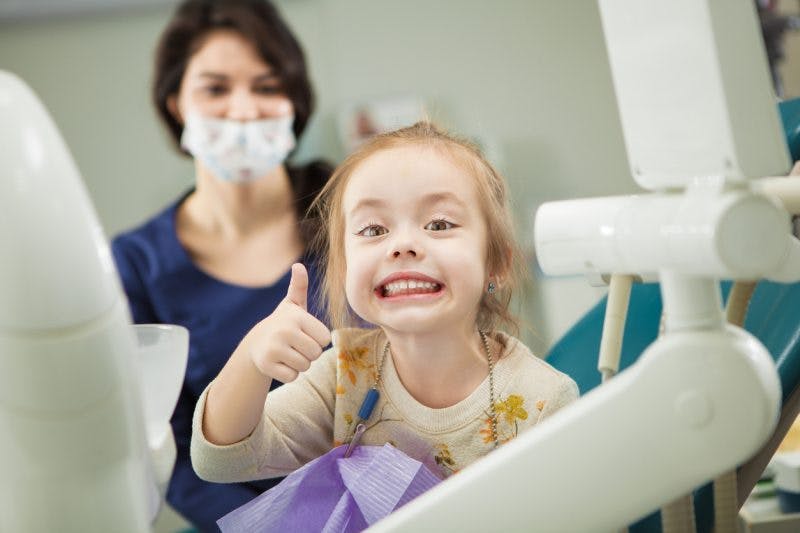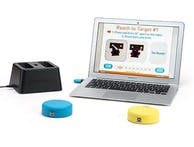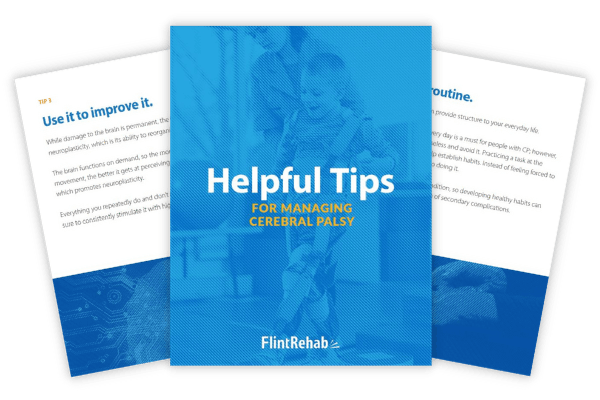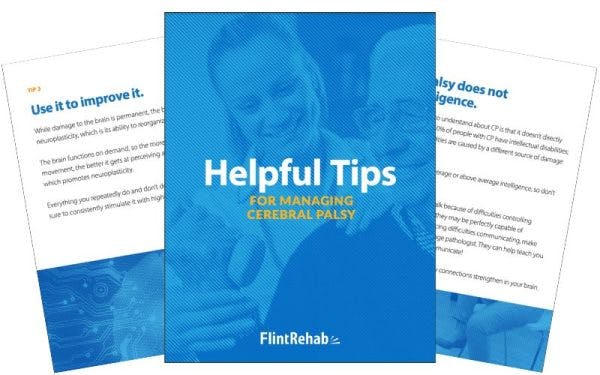Did you know that increased motor impairment is directly linked to poor oral hygiene in individuals with cerebral palsy?
In this article, we’ll explain how cerebral palsy can affect your child’s teeth and share some tips for optimizing oral hygiene.
How Cerebral Palsy Affects Oral Health
While cerebral palsy does not directly affect the health of your child’s teeth, there are many conditions associated with CP that can result in poor oral health.
Oral Motor Impairments
The oral muscles allow you to chew, swallow, and talk.
However, individuals with severe cerebral palsy may experience oral motor impairments.
If a child with cerebral palsy has spasticity (involuntary muscle contractions) in the oral muscles, they’ll have limited ability to control their mouth movements.
This may result in food staying in the mouth for longer periods of time, which can contribute to tooth decay.
Limited Arm Function
Even if cerebral palsy does not affect a child’s oral muscles, they can have difficulties brushing their teeth and flossing.
Spastic muscles can severely affect one’s ability to perform self-care activities due to limited range of motion and stiffness in the joints.
For example, if a child with cerebral palsy has spasticity in the arms or hands, they may not be able to grasp their toothbrush or lift it to their mouth.
Bruxism
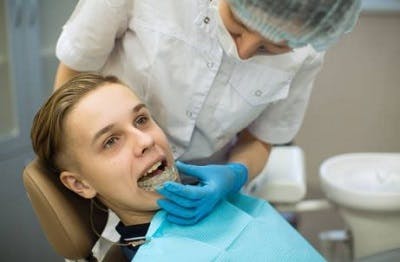
Bruxism is the medical term for teeth grinding or clenching.
It’s reported as the most common type of central sleep disorder in individuals with cerebral palsy.
Although it is more common during sleep, it can also occur during the day.
Children may unconsciously clench or grind their teeth when they are stressed or bored.
While it may seem like a harmless habit, teeth grinding does have many negative consequences including:
- tooth sensitivity
- jaw pain
- headaches
- worn-down teeth
Malocclusion
Malocclusion is the medical term for misaligned teeth.
It’s more common in children with cerebral palsy than children without.
Effects of malocclusion include:
- tooth overcrowding (which can cause pain)
- an underbite
- protruding teeth
- eating, breathing, or sleeping challenges
- difficulties cleaning teeth (which can cause tooth decay)
- excessive drooling
Gastroesophageal Reflux Disease (GERD)
Many individuals with cerebral palsy to have gastroesophageal reflux disease.
GERD is a digestive disorder in which stomach acid irritates the lining of the esophagus. It causes heartburn, vomiting, and nausea.
Stomach acids from frequent vomiting can erode the outer layer (enamel) that protects your teeth from decay.
7 Tips for Optimizing Oral Health in Children with Cerebral Palsy
Wondering what you can do to help optimize your child’s oral health?
Check out these 7 helpful tips for managing oral hygiene in children with cerebral palsy:
1. Find A Dentist Who Specializes in Care for Children with Special Needs
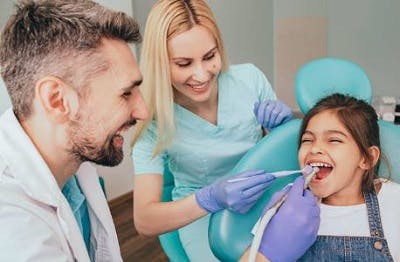
Finding the right dentist can make all the difference!
Children with cerebral palsy may demonstrate seizures, emotional outbursts, and difficulties controlling the muscles in their mouths.
Having a dentist that understands the condition and specializes in treating individuals with motor impairments will help optimize your child’s dental experience.
2. Use an Electric Toothbrush
Using an electric toothbrush can make brushing teeth a fun experience for your child.
Many electric toothbrushes for children come in fun designs, play music, and light up for the recommended 2 minutes. Electric toothbrushes also require less continual movement to use effectively and can clean teeth more thoroughly when used correctly.
For children who have trouble with gripping due to spasticity, an electric toothbrush can also be a great alternative to a standard toothbrush, as the handles are often larger and easier to grasp. Using a flosser rather than having to manipulate a piece of floss can also allow those with hand or arm spasticity to more easily complete oral hygiene.
Keep in mind that if your child has difficulties brushing their teeth, the process will likely take a little longer.
3. Supervise Your Child’s Oral Hygiene Routine

Including toothbrushing as part of the typical morning and bedtime routines can make it less likely that your child will forget to complete it.
Supervise your child as they perform their oral hygiene routine and make sure that it is thoroughly accomplished. Many children won’t brush their teeth properly (or at all) if no one is watching.
Children with cerebral palsy often have problems cleaning their teeth on their own because their jaw muscles are so tight or because they can’t hold their toothbrush.
If your child is unable to brush their teeth independently, you will need to do it for them.
The dentist will likely advise you to use a foam block in order to keep your child’s mouth open.
4. Wear A Mouthguard
Wearing a mouthguard can help protect your child’s teeth from wear and tear caused by long-term grinding.
However, children prone to gagging may reject the mouth guard. In such cases, alternatives like crowning may be considered.
5. Praise Your Children for Taking Care of Their Teeth
A little bit of praise can go a long way.
It will motivate your child to try harder to stop grinding their teeth and be more thorough with their oral hygiene.
Many times, children with CP are unaware of their teeth grinding, so once they become conscious of it, they’ll catch themselves and stop.
6. Ask Your Child’s Doctor About Botox Injections

Botox injections can help relax tight muscles and make it easier for your child to take care of their teeth.
The effects of Botox typically last 3-6 months and while it is not a permanent solution, it can serve as an alternative for children who cannot wear a mouthguard.
7. Manage Underlying Causes
It’s essential to identify what’s causing your child’s oral health problems and manage them appropriately.
If it’s spasticity in the arms, talk to your child’s doctor about muscle relaxants, occupational therapy, physical therapy, and Botox.
If it’s GERD, avoid acidic, spicy, and greasy foods, and ask your child’s doctor about medications to reduce acidity in the stomach.
Children with oral motor impairments will benefit from speech and language therapy, where they can practice exercises to strengthen their jaw muscles.
Understanding Cerebral Palsy and Oral Health
Not all children with cerebral palsy will have difficulties managing their oral health.
Generally, the more severe the cerebral palsy, the higher the likelihood of poor oral hygiene.
Hopefully, this article helped you understand how cerebral palsy can affect your child’s teeth.
Even though CP can make it more difficult to take care of your child’s teeth, it should not be a reason to neglect oral hygiene.

